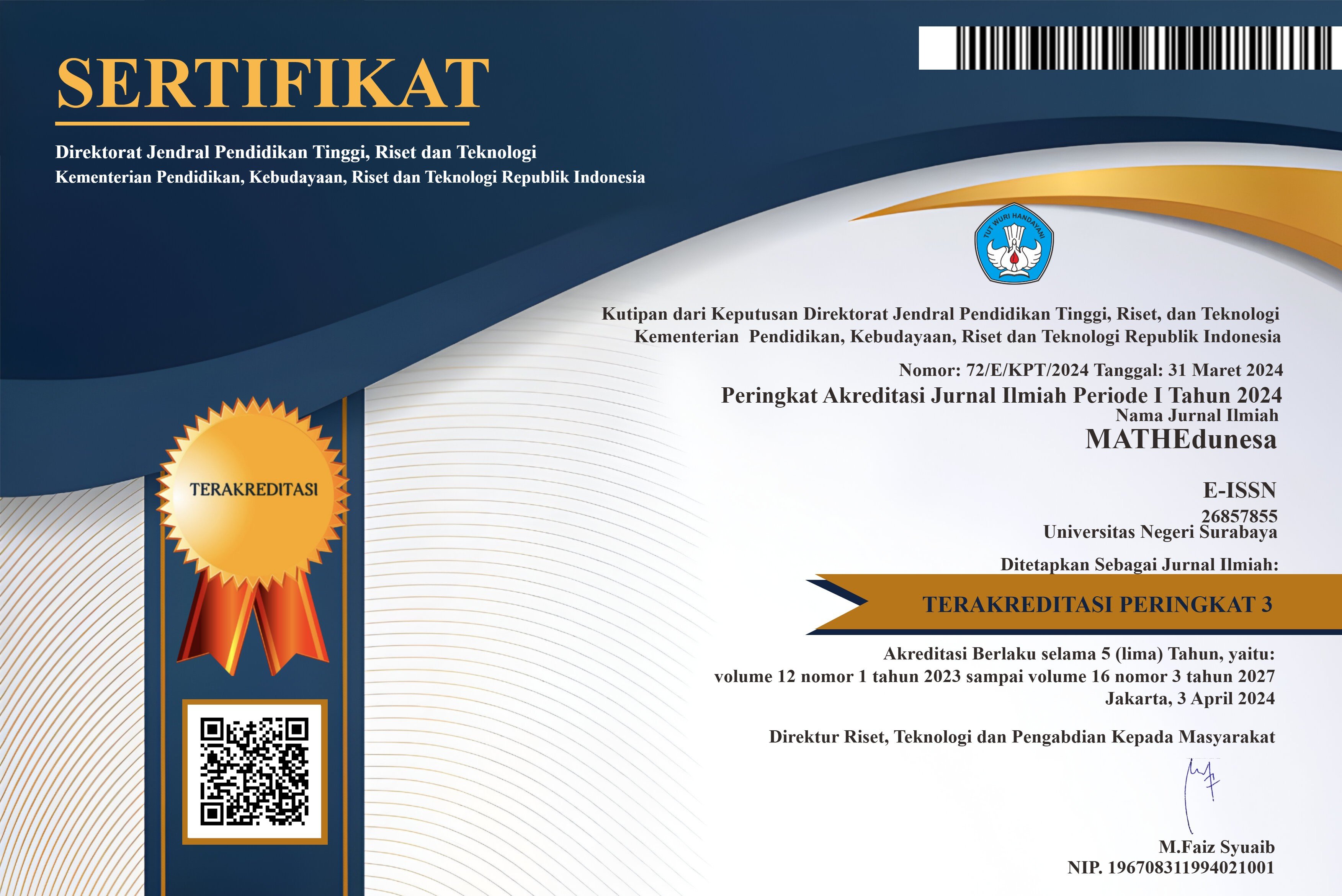Profil Pengajuan Masalah Matematika Siswa SMP Ditinjau dari Gaya Kognitif Reflektif dan Impulsif
DOI:
https://doi.org/10.26740/mathedunesa.v8n2.p209-215Abstract
Abstrak
Penelitian ini bertujuan untuk mengetahui bagaimana profil pengajuan masalah matematika siswa SMP bergaya kognitif reflektif dan impulsif siswa kelas VIII SMP Negeri 1 Cerme. Subjek penelitian ini adalah siswa kelas VIII A SMP Negeri 1 Cerme yang berjumlah 6 siswa dimana masing-masing adalah 3 subjek bergaya kognitif reflektif dan 3 subjek bergaya kognitif impulsif. Dipilihnya 2 kategori gaya kognitif subjek tersebut atas dasar hasil MFFT, hasil Tes Kemampuan Matematika, dan rekomendasi dari guru mitra. Penelitian ini digolongkan dalam penelitian kualitatif eksploratif. Teknik pengumpulan data yang digunakan dalam penelitian ini adalah tes tulis, wawancara, dan dokumentasi. Pengajuan masalah yang diperhatikan dalam penelitian ini adalah pengajuan masalah matematika yang berkaitan dengan materi SPLDV. Hasil penelitian menunjukkan bahwa subjek bergaya kognitif reflektif pada tahap memahami masalah cenderung membaca informasi berkali-kali agar dapat memahami masalah. Pada tahap menyusun rencana pembuatan masalah mereka dalam membuat soal sekaligus memikirkan jawabannya dengan taraf soal sedang ke tinggi. Pada tahap membuat masalah mereka cenderung membuat draf/kerangka soal sebelum menentukan soal mana yang akan diajukan. Pada tahap memeriksa soal, strategi penyelesaian, dan jawaban, mereka cenderung memeriksa setiap informasi agar datanya lengkap. Sedangkan subjek bergaya kognitif impulsif pada tahap memahami masalah cenderung tidak perlu berkali-kali dalam membaca informasi untuk dapat memahami masalah. Pada tahap menyusun rencana pembuatan masalah mereka dalam membuat soal tidak sekaligus memikirkan jawabannya dengan taraf soal sedang ke rendah. Pada tahap membuat masalah mereka cenderung tidak perlu membuat draf/kerangka soal, mereka membuat soal terlebih dahulu kemudian baru mengerjakannya. Pada tahap memeriksa soal, strategi penyelesaian, dan jawaban, mereka cenderung memeriksa soal dan penyelesaian hanya sekilas.
Kata kunci: pengajuan masalah, gaya kognitif reflektif, gaya kognitif impulsif, MFFT
Abstract
This study aims to discover how the profile of mathematical problem posing for junior high school students is in the reflective and impulsive cognitive style of VIII grade of Cerme 1 Public Middle School (SMPN 1 Cerme). The subjects of this study were eighth grade students of Cerme State Middle School (SMPN 1 Cerme), totaling 6 students, each of which was 3 subjects using reflective cognitive style and 3 subjects using impulsive cognitive style. Two categories of subject cognitive styles were chosen based on MFFT results, Mathematics Ability Test results, and recommendations from partner teachers. This research is classified into explorative qualitative research. Data collection techniques used in this study were written tests, interviews, and documentation. Problem posing considered in this study is the problem posing related to SPLDV material. The results of the study show that the subject of cognitive reflective style, during the stage of understanding the problem, tends to read information repeatedly in order to understand the problem. Then, during the stage of compiling a plan for making their problem, whether in making a question while thinking about the answer, it was done from a moderate to higher question. At the stage of making a problem they tend to form a draft / question frame before determining which questions to ask. At the stage of checking questions, resolution strategies, and answers, they tend to check every information thus the data is complete. On the other hand, the subject of cognitive impulsive style, during stage of understanding the problem, tends to overlook reading the information many times to be able to understand the problem. Then, during stage of compiling a plan for making their problem, while in making a question, they were not thinking about the answer at the same time, with the level of the problem being moderate to low. At the stage of making a problem, they tend to overlook the need to make a draft / frame questions, they make questions first and then solve them. At the stage of checking questions, resolving strategies, and answers, they tend to check questions and solutions only at a glance.
Keywords: problem posing, reflective cognitive style, impulsive cognitive style, MFFT
Downloads
Downloads
Published
Issue
Section
 Abstract views: 158
,
Abstract views: 158
, PDF Downloads: 194
PDF Downloads: 194




